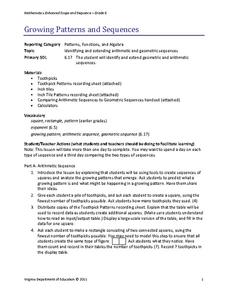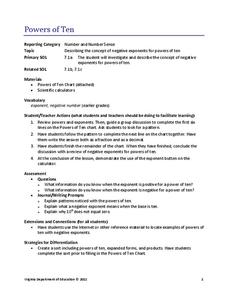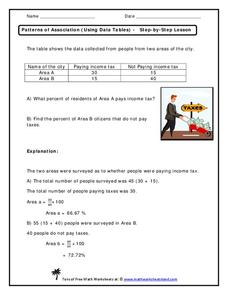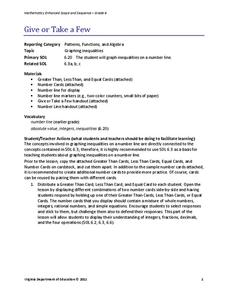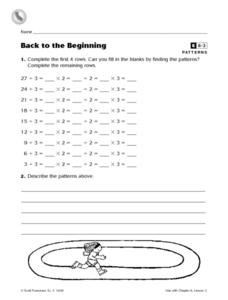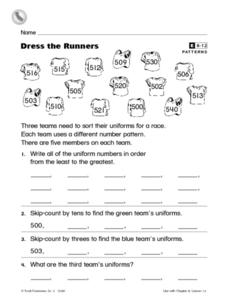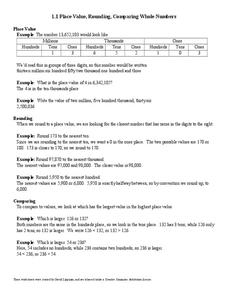Rational Number Project
Initial Fraction Ideas Lesson 18: Overview
Develop young mathematicians' ability to compare fractions with investigation into the number 1/2. After brainstorming a list of fractions equivalent to 1/2, children identify a pattern in the numerators and denominators that allows them...
Curated OER
Patterns in the Multiplication Table
Explore patterns in the multiplication table in order to deepen your third graders' understanding of this essential skill. Implement this activity as a whole-class lesson plan, allowing students to work in pairs or small groups to...
West Contra Costa Unified School District
The Power of Ten: Building a Magnitude Model
Add visual representation to teaching place value with a magnitude model. Using adding machine tape, pupils build a linear place value strip from 1 to 100.
Curated OER
Represent Mixed Numbers on a Number Line
This number line sequence is missing a few mixed numbers. Scholars determine what the increments are between each segment and use the pattern to complete the sequence. They must count by quarters and write in mixed numbers. Because there...
Curated OER
What's the Pattern?
In this pattern instructional activity, 3rd graders find the missing number to complete each of the six patterns. The missing numbers are provided and students determine which pattern they belong in.
Virginia Department of Education
Growing Patterns and Sequences
Learners explore, discover, compare, and contrast arithmetic and geometric sequences in this collaborative, hands-on activity. They build and analyze growing patterns to distinguish which kind of sequence is represented by a set of data...
Virginia Department of Education
Powers of Ten
Investigate negative exponents of-ten. Pupils use the pattern of increasing powers of 10 to determine negative powers of 10. The scholars write the powers in expanded and product forms and make the connection to exponents using a...
Charleston School District
Pythagorean Theorem and Converse
You've heard that it is true, but can you prove it? Scholars learn the Pythagorean Theorem through proof. After an overview of proofs of the theorem, learners apply it to prove triangles are right and to problem solve. This is the second...
Math Worksheets Land
Patterns of Association (Using Data Tables) - Step-by-Step Lesson
This worksheet belongs to a four-part resource that gathers information from data tables to calculate percentages. The page introduces one problem and shares an explanation to the answer.
EngageNY
Even and Odd Numbers
Even or not, here I come. Groups investigate the parity of products and sums of whole numbers in the 17th lesson in a series of 21. Using dots to represent numbers, they develop a pattern for the products of two even numbers; two odd...
Virginia Department of Education
Give or Take a Few
Young mathematicians extend their knowledge of rational numbers on a number line to graph inequalities by first using number cards to compare rational numbers. They finish by using similar reasoning to graph inequalities on a number line.
EngageNY
When Can We Reverse a Transformation? 1
Wait, let's start over — teach your class how to return to the beginning. The first instructional activity looking at inverse matrices introduces the concept of being able to undo a matrix transformation. Learners work with matrices with...
Virginia Department of Education
Balanced
Bring balance to your lesson plans with an activity that asks individuals to solve one-step linear equations with inverse operations. Balance scales help learners understand the concept of isolating the variable.
Curated OER
Back to the Beginning
In this number pattern worksheet, 4th graders fill in the number sentence while looking for a pattern. The 9 number sentences are made up of multiplication and division problems. Also students are asked to provide a short response...
Curated OER
Dress the Runners
In this number patterns worksheet, students write 16 three digit uniform numbers in order from least to greatest. Students then skip count by tens and threes using those same numbers.
EngageNY
Logarithms—How Many Digits Do You Need?
Forget your ID number? Your pupils learn to use logarithms to determine the number of digits or characters necessary to create individual ID numbers for all members of a group.
Virginia Department of Education
Integers: Addition and Subtraction
Young mathematicians construct their own understanding of integers with an inquiry-based math lesson. Using colored chips to represent positive and negative numbers, children model a series of addition and subtraction problems as they...
Math Worksheets Land
Patterns of Association (Using Data Tables) - Guided Lesson
The activity belongs to a four-part resource that applies percentages to data tables. The page has three practice problems that continues with the development of this topic.
Charleston School District
Tables of Linear Functions
Don't forget the tables! The previous lessons in this five-part series examined the linear equation and graph relationship. The current lesson adds tables to the mix. At completion, individuals should be able to create a table of values,...
Charleston School District
Constructing Rotations
An instructive lesson provides the basics on how to perform rotations on the coordinate plane. The handout also covers rotating about a point other than the origin and how to perform a series of transformations.
Curated OER
Two for One Box Company
Here is a challenging and thought-provoking math learning exercise. In it, learners work together to construct a variety of boxes of different sizes to see if doubling the size of a box really means it can hold twice as much stuff as the...
Math Worksheets Land
Patterns of Association (Using Data Tables) - Independent Practice Worksheet
Here is a worksheet that belongs in a four-part resource that has learners practice using data tables to calculate percentages. The page has ten problems with different data tables asking to find different percents.
Howard County Schools
Setting the Table
How many people can fit around a table? Depends on the size of the table, right? Explore patterns to generate an equation for the number of people that can fit around a table given its size.
Open Text Book Store
Arithmetic for College Students: Worksheets
Loaded with concepts ranging from multiplying decimals to converting units to solving problems using the order of operations, a thorough practice packet is perfect for a fifth or sixth grade math classroom.







